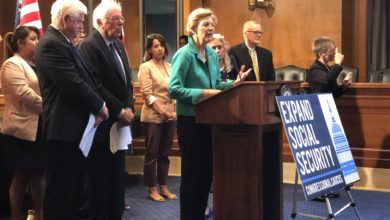[dropcap]S[/dropcap]ergeant La David T. Johnson died fighting for us. By all accounts, he was an exemplary soldier and a loving husband and father.
Donald Trump shamefully dishonored Sgt. Johnson’s memory and disrespected his widow. The rest of us cannot undo his insensitivity and refusal to apologize. Through our Social Security contributions, however, we are doing what we can to honor Sgt. Johnson’s service and his family’s immeasurable sacrifice. Our contributions provide some measure of economic security to the Johnsons and millions of other families that have lost loved ones in the prime of their lives.
Although most people associate Social Security with retirement, one out of three beneficiaries receive disability or survivors’ benefits. Thanks to the Social Security benefits Sgt. Johnson earned, his three children — six-year old Ah’Leesya, two-year old La David Jr., and La’Shee, due January 29 — will receive monthly Social Security benefits until their eighteenth birthdays, or nineteenth, if still in high school.
If any of the three children suffer further misfortune, in the form of serious and permanent disability prior to turning age 22, that disabled child of Sgt. Johnson will continue to receive benefits as an adult, thanks to the benefits he earned for them. And Sgt. Johnson has earned benefits for his widow, payable until his youngest child turns sixteen, so she may be able to stay home and care for them.
Nothing can replace the Johnson family’s heroic father and husband. But all of us, collectively through Social Security, can replace a portion of his earnings. Every payday, our Social Security contributions are deposited in the Old Age, Survivors, and Disability Trust Funds of Social Security. (Emphasis added.)
Because Social Security is primarily current-funded, those monies, deducted from our paychecks, provide monthly benefits to two million children who have lost parents, as well as another million whose parents have become disabled or retired. Now, Ah’Leesya Johnson and La David Johnson Jr. will receive those monthly benefits too. And so will La’Shee Johnson, once she is born.
The benefits Sgt. Johnson earned for his family are extremely valuable. The Social Security Administration actuaries have calculated the present value of those benefits in the case of a family of four consisting of a 30-year-old worker earning around $35,000 with two young children and a spouse at home caring for the children. If that worker were killed, that family’s Social Security life insurance protection would provide the children and their widowed parent monthly benefits with a present value of more than $674,000.
These are the benefits that children receive in their own right. An additional three million children live in households whose family income includes Social Security. In fact, Social Security is the largest source of income for grandparents raising grandchildren. In total, nine percent of all American children under the age of 18 are direct or indirect Social Security beneficiaries.
Prior to the enactment of Social Security, families like the Johnsons might have been forced to separate, divided from one another after the kind of tragedy they just endured. Surviving parents, unable to support their families, were often forced to have relatives take in their children. Worse, orphanages housed children who had living parents who could not afford to keep them. Social Security has made those tragic separations, which compounded the tragedy of losing a parent, no longer a familiar part of our lives.
Today, Social Security lifts over a million children out of poverty and lessens the depth of poverty for millions more. For many bereaved families, Social Security is the difference between some measure of independence and the dependence suffered by those who find themselves caught in abject poverty.
Social Security benefits are particularly important to military families like the Johnsons, because serving in a war zone drastically increases the risk of death or disability. More than 6,800 American servicemen and women have been killed on active duty in the wars in Iraq and Afghanistan, leaving behind more than 4,000 children.
While Sgt. Johnson’s tragic death is high profile enough to have moved thousands of compassionate Americans to contribute considerable funds to a GoFundMe page established on his family’s behalf, the sacrifices of the overwhelming majority of military families do not make front-page news stories. More importantly, in the wealthiest country in the world, the families of those who have served our nation should not be forced to rely on private charity to get by. Through Social Security and other government benefits, all of us come together to provide for these families and honor their loved one’s sacrifice.
The critical role of Social Security’s life insurance protections is especially visible at times of national tragedy, such as the September 11th, 2001 terrorist attacks. Virtually every child who lost a parent that day was eligible for Social Security benefits, and some who were very young that day are still receiving benefits today.
Social Security’s benefits are vital, but they are inadequate. They should be expanded. Prior to 1981, children like Ah’Leesya, La David Jr., and La’Shee Johnson could receive benefits until age 22, if they chose to enroll in college, university, or vocational training after high school. This is only right. After all, parents generally support their children in obtaining post-secondary education, if they are able. When the parent is no longer earning a wage, all of us, through Social Security, are taking on that responsibility.
That benefit should be restored for the Johnson children and all the others receiving benefits as the result of the death or disability of a parent. At a time when college is more expensive than ever, restoring that benefit is the least we can do for children who have faced the adversity of growing up without a parent who can support them.
In addition to restoring student benefits, Social Security’s vital but modest benefits should be expanded for both current and future beneficiaries, so a larger percentage of lost wages are replaced. The Johnson family deserves that. All of us do.
Sgt. Johnson and his clearly extraordinary widow remind us of the importance of family and heighten our appreciation for those who sacrifice in service to the rest of us. It also highlights the value of our Social Security system — reliable and essential in an insecure world.
Past generations have made our lives better by creating and expanding Social Security. Now it is our turn. Let’s expand Social Security for the Johnson family and all our families that work hard and contribute every day. As the Johnson family knows only too well, tragedy can strike any of us at any moment. Let’s honor their sacrifice. Let’s increase our own economic security. Now is the time to expand Social Security for them and for us.








